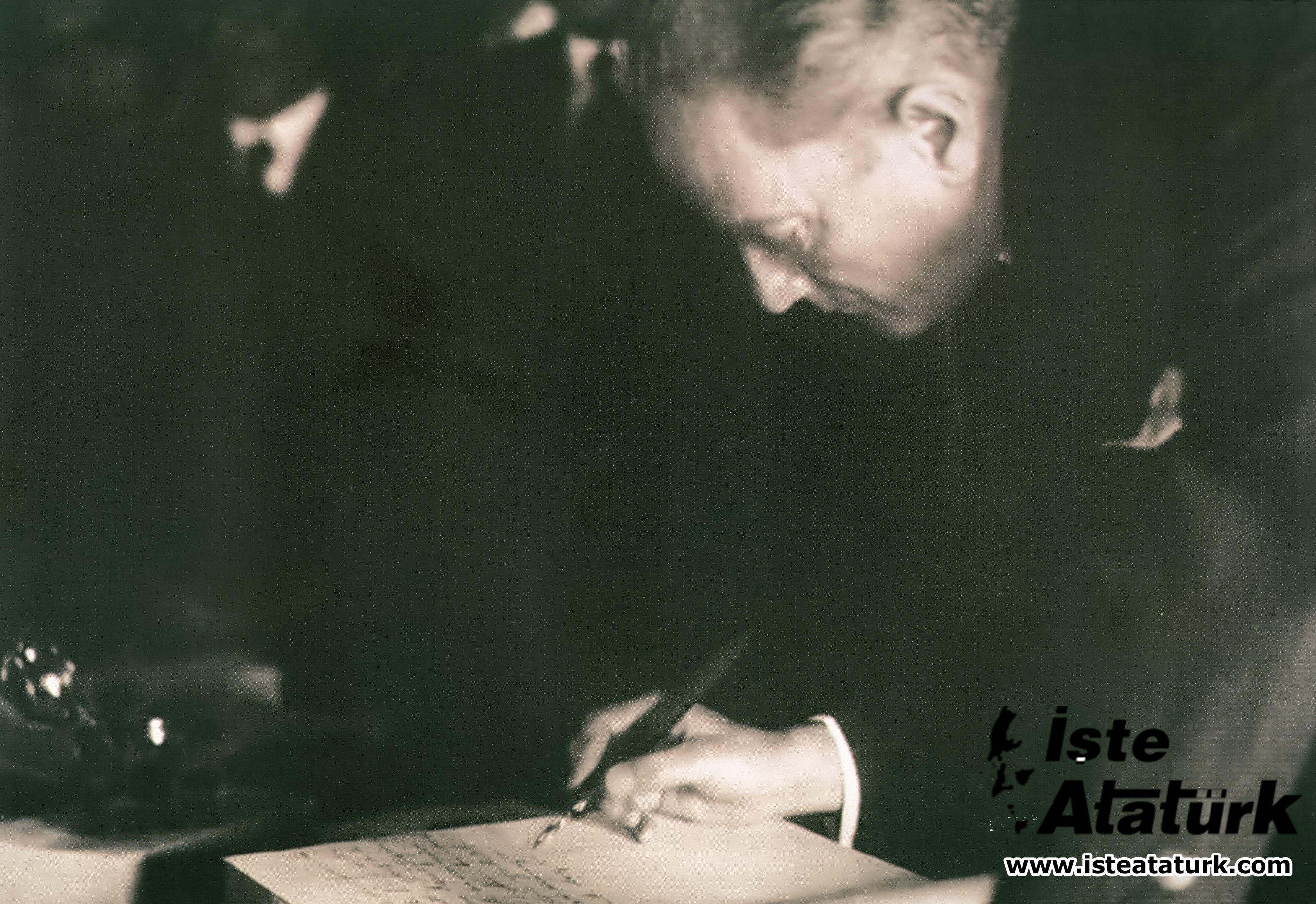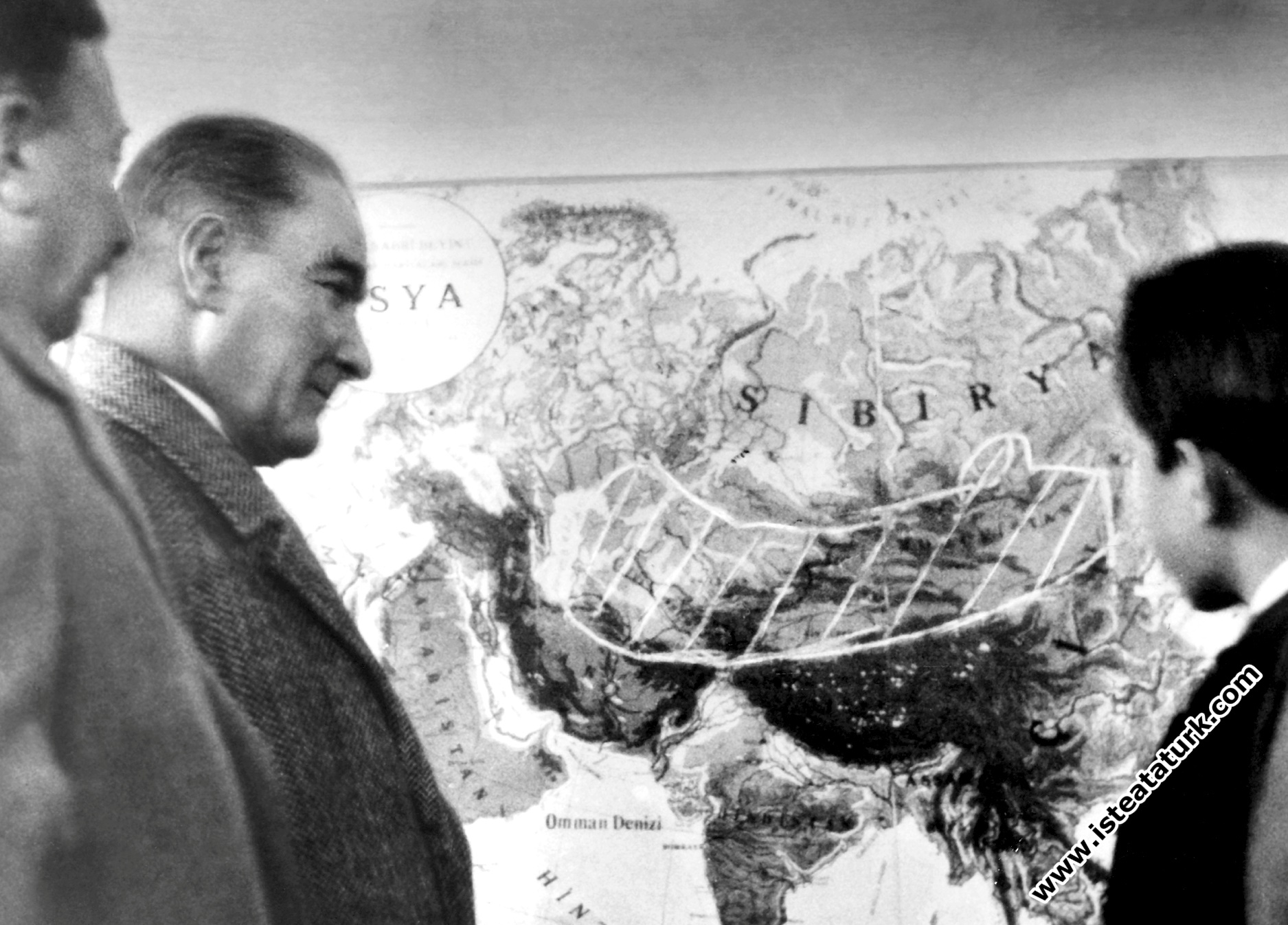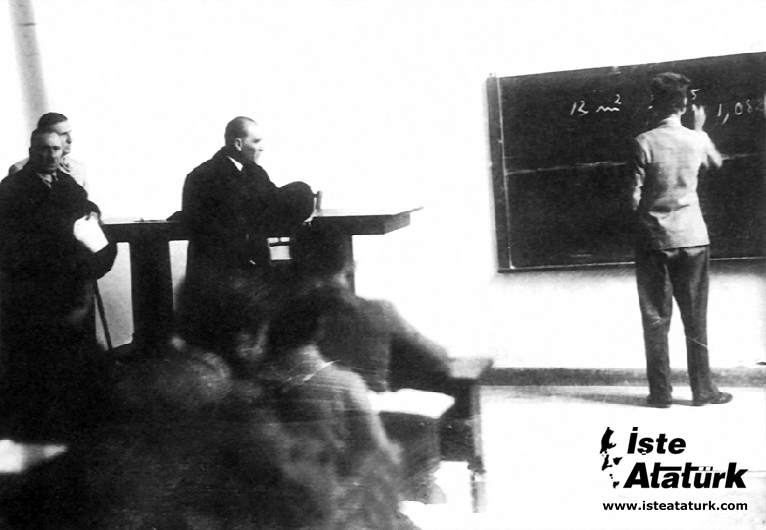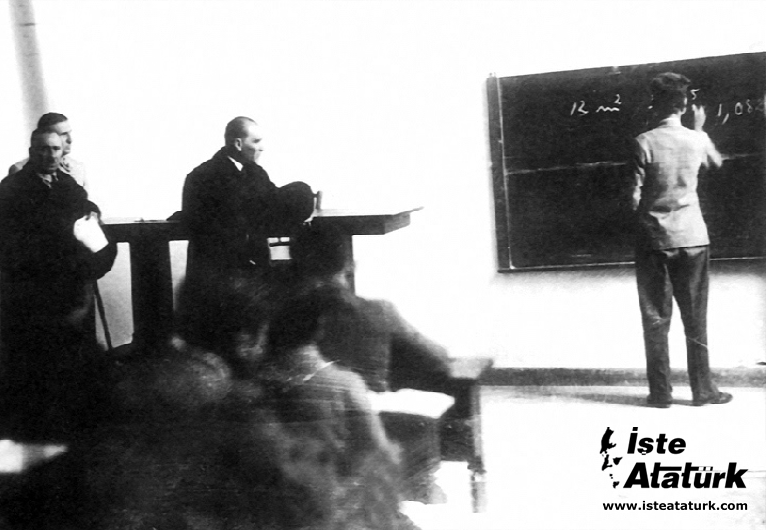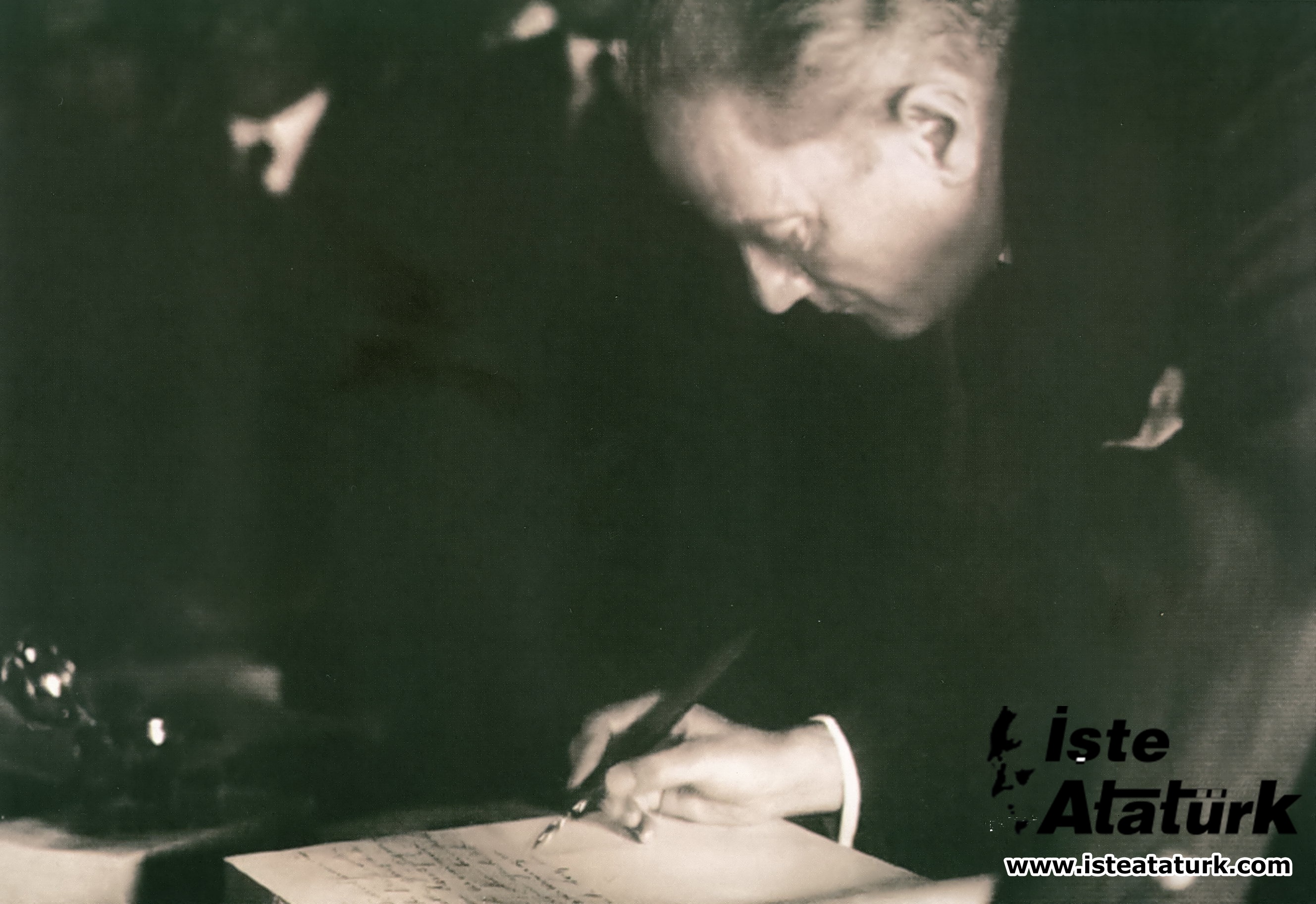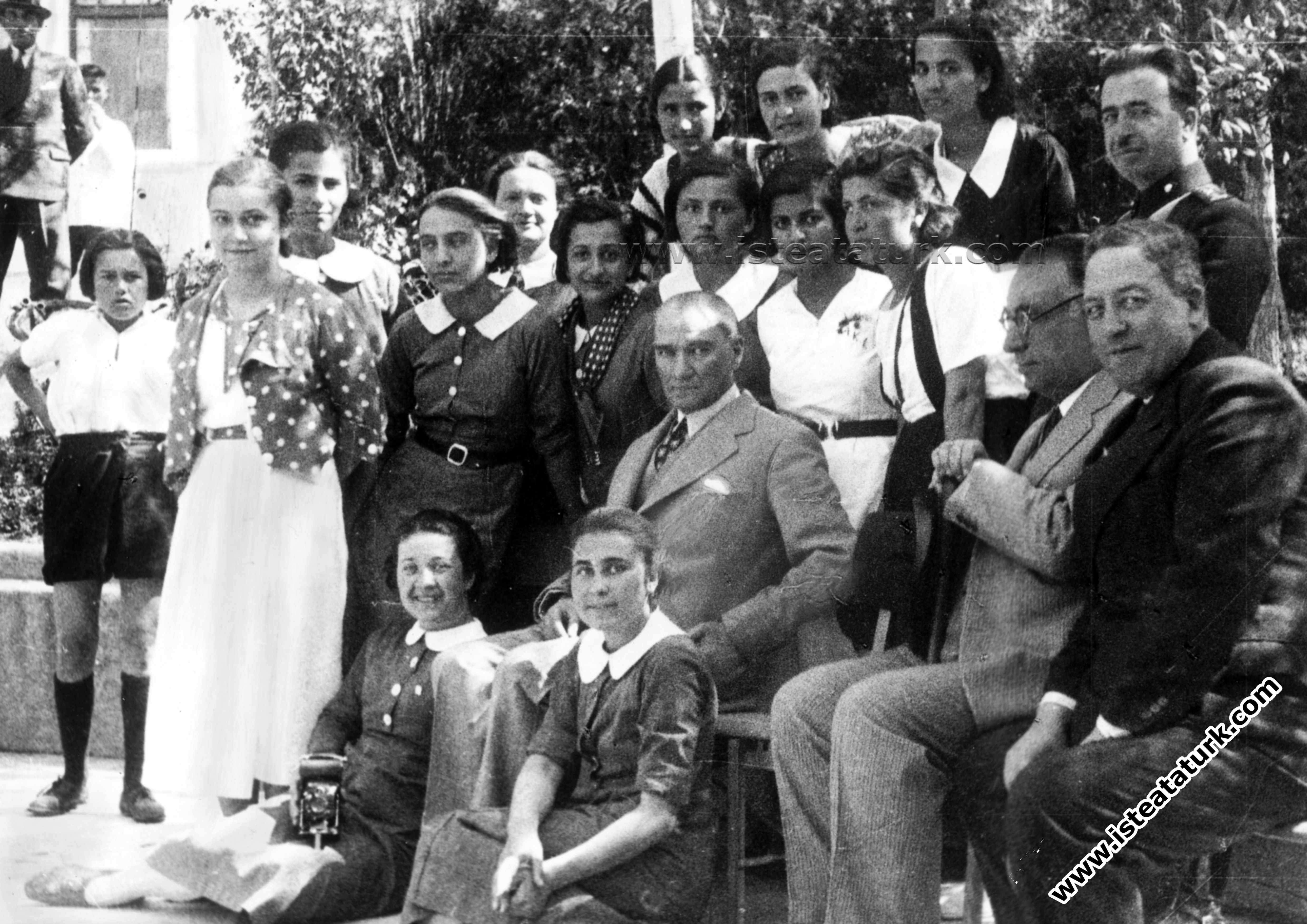
Atatürk and Women's Education
Character Size
“In short, let's be brave in the issue of women, let go of delusions, let them open up, decorate their minds with serious sciences and sciences, give priority to their honor and pride.” Mustafa Kemal Atatürk
ATATÜRK and WOMEN'S EDUCATION
The social heritage that Republican Turkey took over from the Ottoman Empire was that Turkish women, who were excluded from economic and social life, were deprived of equal rights with their men. As a leader who aims to raise the Turkish nation to modern living conditions and the level of civilization as soon as possible, the subject that Atatürk gives priority in all his reforms is national education; Because he regarded national education as the basis of development.
Atatürk believed that a society that did not educate its women could not rise. For this reason, it has taken it as a duty to remind at every opportunity the fact that "As long as half of a society is tied to the lands with chains, it is impossible for the other half to rise to the skies".
In the diaries that Atatürk kept while he was being treated in Vienna-Karlsbat on 1-28 July 1918, he wrote that those who lived by adhering to the old traditions did not comply with the conditions of the time, and especially a man working in a civil life would want his wife to be at the same level for social and intellectual life. says:
“In short, let's be brave in the issue of women, let go of delusions, let them open up, decorate their minds with serious sciences and sciences, give priority to their honor and pride.”1
We understand from these diaries that Atatürk thought that women should be educated at that time.
Before the Sakarya War, that is, 15 months after the establishment of the Turkish Grand National Assembly Government, at the Education Congress convened on 16 July 1921, Atatürk, while addressing the teachers, stated that the reason for the collapse of the Empire was lack of education, and argued that "National Education can be established with the cooperation of female and male teachers." This has a deep meaning in showing the importance that the Great Leader gives to the cause of education among the struggles for national liberation. 2
In his opening speech to the Turkish Grand National Assembly on March 1, 1922, after emphasizing the importance of education issues, Atatürk talked about the education of our women by passing the same education degrees as men, and expressed his views on this subject as follows:
“It should be the basis of our national education method to give the primitive information necessary to eliminate ignorance on the one hand and to make the children of the country effective and productive in social and economic life, on the other hand. In secondary education, it is essential to comply with the principle that the education and training method should be practical and applied. Emphasis will be placed on the education of our women by going through the same level of education.”3
On October 27, 1922, a group of teachers, men and women, came to Bursa from Istanbul to celebrate Mustafa Kemal's great victory. In his speech addressed to this group, Atatürk said:
“Teacher ladies, teacher gentlemen! In order for all these truths to be well understood and digested by the nation, first of all, it is necessary to eliminate ignorance. For this reason, the cornerstone of our education program and our policy is the elimination of ignorance. Unless this is fixed, we are in our place... Something that stays in place means it is going backwards. While trying to eradicate general ignorance on the one hand, it is necessary to train active and useful, efficient staff in social life on the other hand. Ladies and Gentlemen! We must know that nations living in two parts are weak and sick.”4
With this speech, Atatürk gave the first signs of the need for all citizens, male and female, to benefit from equal opportunities, regardless of gender, and even the Law on the Teaching Union.5
In his speech at the banquet given in his honor at the Bursa Sultani School on January 23, 1923, nine months before the proclamation of the Republic, Atatürk stated that science and education are more effective than bayonets and cannons, and that the homeland will progress with the work of men and women, who are an inseparable whole, and explained his belief in this matter with the following words:
“Gentlemen! There is no doubt that if these armies of knowledge and knowledge are formed with only a part of the organs of the nation, it is certainly incomplete. Society consists of two elements necessary for each other. Unless these two elements are each other's helpers and protectors in all respects, the society is incomplete and the armies of salvation that are formed from it and that will continue to exist are half and weak.
Ladies and Gentlemen! One of the two elements I want to talk about is you (to the Ladies) and the other one is you (to the Gentlemen)... These two parts have to be equal to each other in all respects. This is what reason, logic and nature command. Essentially, this equality between two entities; It also applies to society as a whole. For this reason, our women; will be equal to our men in science and in activity; that is, they will reach the same level of maturity... It is obvious that women and men should receive education and training in the same way. For this reason, the new State of Turkey and the Government of the Turkish Grand National Assembly will take this point into consideration, especially in the education programs they will follow from now on. Of course, our women will go through the same education levels as men, for themselves and for their femininity, they will be able to do the duties that society demands of them. I feel great happiness in my heart to see how prosperous, developed and happy our country and society will be, as I think about the level our women can reach and the devoted sons that these women will raise through such programs.”6
On January 31, 1923, in his speech to the public in İzmir, Atatürk continued his words as follows after emphasizing the place of women in the new Turkish society:
“If a society is content with the acquisition of new requirements by only one of its kind, that society will remain weak on the side.
If a nation wants to progress and become civilized, it has to accept this point as a basis. The reason why our society is not successful is due to the indifference and fault we show towards our women. Therefore, if science and technique are necessary for our society, both men and women should acquire them equally. The greatest duty of women is motherhood. Considering that the place where the first training is given is the mother's lap, the importance of this duty is well understood. Our nation has decided to become a strong nation. One of the requirements of today is to ensure that our women are promoted in every aspect. For this reason, our women will also have scholarly and technical knowledge, and they will pass all the degrees of education that men pass.
Our enemies accuse us of being under the influence of religion; they attribute our pause and collapse to this. This is error. Our religion has never demanded that women lag behind men. What Allah commands is for men and women to gain knowledge and knowledge together. Both men and women have to seek knowledge and go wherever they find it, and equip themselves with it.”7
An important part of the speech he gave at the opening of the Turkish Grand National Assembly on March 1, 1923 was about National Education.
“The way to be applied in education and training is to make knowledge a practical and usable device that ensures success in material life rather than an ornament, a tool of tyranny, or a civilized pleasure for people. The Ministry of National Education should attach importance to this principle.”8 With these words, Atatürk clearly showed the way to be applied in education and training, and insisted that the Ministry of National Education organize curricula within these principles.
While Atatürk reminded on March 21, 1923 that being a good mother is the most important duty of women, he emphasized that this can only be achieved with knowledge and culture:
"As time progresses, science develops, civilization walks with giant steps, we know the difficulties of raising children according to the current requirements of life and the century. The upbringing of today's children by mothers is not as simple as in ancient times. Raising children with the necessary characteristics for today's mothers makes their children an active limb for today's life. "It depends on the fact that they have many high characteristics in their person. For this reason, our women are obliged to be more enlightened, more prosperous and more knowledgeable than even men. If they really want to be the mother of the nation, this should be the case."9
In the same speech, he stated that if the conditions were suitable, Turkish women would not fall behind men in any field. He also expressed his belief that Turkish women will not lag behind European women with the following words:
“... The real field of struggle for our women is to be adorned with light, knowledge, culture and true virtue, rather than success in form and disguise, where the real victory is required. I am one of those who have no doubts and are absolutely sure that our esteemed ladies will not be inferior to European women, but will be equipped with the light and wisdom that will rise above them in many ways.” 10
As it can be understood from the words above, Atatürk especially tried to emphasize that women should receive education on an equal basis with men and that they should support and help each other in all matters. It seems that Atatürk made an intellectual preparation for this work before the proclamation of the Republic. After this intellectual preparation period was completed, it immediately entered the legalization period.
On March 1, 1924, II. While opening the first meeting year of the Turkish Grand National Assembly, he declared that it is necessary to implement the principle of unity in education and training without losing a moment. One day after that, on March 3, 1924, with the adoption of the Law of Tevhid-i Tedrisat (Teaching Union), the duality in education was ended. Thus, modern education opportunities were provided to Turkish girls and boys together. With the 1924 Constitution, it was stipulated that primary education is compulsory for all Turks, and the education of girls was made a constitutional order.
In his speech in Kastamonu on August 30, 1925, Atatürk clearly revealed that coeducation is inevitable in the Turkish education system:
“... A society, a nation, consists of two kinds of people, male and female. Is it possible that we advance one part of a mass and tolerate the other so that all the mass can have the honor of ascension? Is it possible that while half of a community is chained to the land, the other half can rise to the sky? There is no doubt that the steps to rise, as I said, must be taken together by the two sexes, as a friend, and must be taken together in the field of progress and innovation. If so, the revolution will be successful. We are pleased to see that today's departure approaches real needs. It is obvious that there is a need to be more courageous.”12
Thus, the mixed education system entered the Turkish education history as a principle for the first time. As a matter of fact, the III. In the light of the decisions taken by the Heyet-i İlmiye, 23 out of 71 schools switched to coeducation in the 1927-1928 academic year.13
With the adoption and implementation of the new Turkish letters, known as the most important educational reform carried out by Atatürk, by the Turkish Grand National Assembly on November 1, 1928, Turkish women, who could not find the opportunity to read, reached the level that men had reached in education. Atatürk stated how important this issue was by saying, “We all must strive to teach every illiterate male and female citizen we come across in our private and public lives.”14 As a result of Atatürk's efforts, the literacy rate, which was 9% in 1923, was 21% in 1938. increased to ,6.15
As it can be seen, Atatürk believed that the women and men of the Turkish Nation were a whole, and because he understood the role of Turkish women in the reshaping of Turkish society, he gave a special importance to his education and set an example for many countries of the world in this regard.
1 A. Afetenan, Atatürk and Turkish Women's Rights, Istanbul, 1968, p. 106; A. Afetan, “The Importance of Recognition of Turkish Women's Rights in the Cultural Revolution”, Cultural Revolution under the Leadership of Atatürk, RCD Seminar, Ankara, 1972, p. 115
2 A. Afetinan, Atatürk and Turkish Women's Rights, p. 107; İhsan Doğramacı, “Atatürk and Education”, Journal of Atatürk Research Center, c. 1, Issue: 3, p. 654
3 Atatürk's Speeches and Statements, c. 1,3. bs., Ankara, 1981, p. 230
4 ibid, c. 2 H. 44, 45
5 Hıfzirahman Raşit Öymen, “Atatürk's Effect on the Transition to Republican Education”, Atatürk Conferences, 1973-1974,5. 190
6 TTK Archive No. 1091
7 Atatürk's Speeches and Statements, c. 2 H. 85, 86
8 ibid., c. 1 second. 298
9 Atatürk's Speeches and Statements, c. 2 H. 152
10 ibid, p. 152, 153
11 Ahmet Mumcu et al, Ataturk's Principles and History of Revolution II, Kemalism (Basics of Ataturkist Thought System), 1986, p. 160-162; Şerafettin Turan, “Tevhid-i Tedrisat” Cultural Revolution under the Leadership of Atatürk, RCD Seminar, p. 83, 84
12 Atatürk's Speeches and Statements, c. 2 H. 216, 217
13 Galip Karagözoğlu, “The Role and Necessity of Education in the Settlement and Realization of Atatürk's Revolution”, Kemalism, 2nd book, p. 13
14 Atatürk's Speeches and Statements, c. 1 second. 360
13 Galip Karagözoğlu, “Atatürk's Educational War”, Journal of Atatürk Research Center, c. 2, number: 4, p. 213
Aynur Gedil
Kaynak: ATATÜRK ARAŞTIRMA MERKEZİ DERGİSİ, Sayı 13, Cilt V, Kasım 1988
